From Fighter to Coach, The Journey of Naomi Cookson
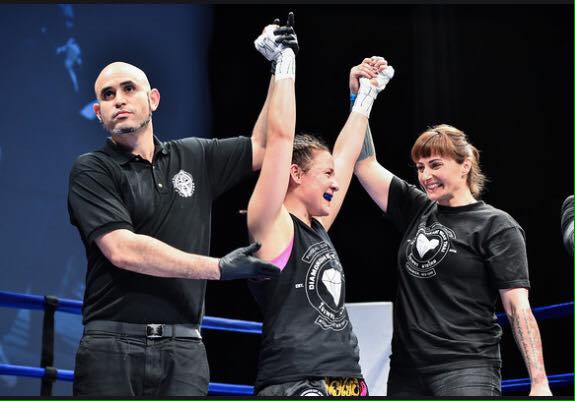
“I didn’t even cut weight for my last fight,” Naomi Cookson says, as she sits cross-legged in the cage where we are conducting our interview. The sounds of coaches yelling and pads being hit on the floor below almost drown out her voice. “Training Muay Thai was supposed to be fun for me, but the whole weight and weight-cutting thing just made it miserable. It was either quit training or just not cut weight. I chose what would make me happier.”
Light freckles are scattered across the bridge of her nose and cheeks, and she has her legs tucked tightly into her body. Despite Naomi’s friendly openness as she retells her formidable journey, her body language still illustrates the desire to keep who she is to herself.
“My eating disorder manifested intensely once I started training Muay Thai,” Cookson continues. “It became less about fighting and loving the sport, and more about having to lose weight. It was about having to get on a scale, nearly naked in front of everyone, and have them see how much you weigh. It was very stressful. My weight and body had been so private, but now I was forced to make it public.”
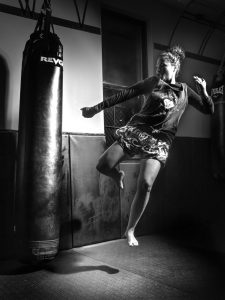
Cookson first began training Muay Thai in Thailand nearly 8 years ago. After living in various parts of the world, she wanted to spend time with her mother who was living in the country, so she set off. An athlete for her entire life, Naomi decided to put aside triathlons and started to learn Thai Boxing. She began her training at the National Stadium where she learned Muay Boran (the ancient, more form-based style of the sport), and at age 26 switched to training with another well-known Nak Muay, Anne Lieberman, at Jitti Gym.
A contrast to American academies, Naomi was not given much direction in the Thai gym and it took some time for her to really understand how to throw a proper kick or punch. Motivated by her newfound training partner and soon-to-be best friend, she attended consistently for several months, sometimes training up to three hours a day. After gaining admission to a grad school in New York, Cookson left Thailand for the States. There, she was once again reunited with Lieberman at Kru Natalie Fuz’s academy, Chok Sabai.
“Anne is a big part of my journey with Muay Thai,” Naomi says with a smile. As she speaks, Lieberman is downstairs holding pads for a beginner student. Her voice carries up to us and we can hear her give technical advice.
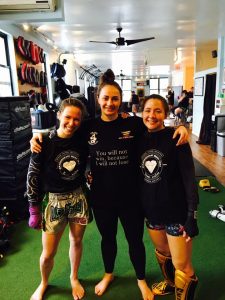
“We had met in Thailand because we had some mutual friends and everyone kept telling the both of us that we should meet. I started going to Chok Sabai on her recommendation, and eventually we ended up living together for some years. Our first fights were around the same time, and we both became coaches [Naomi at Physical Culture Collective, Anne at Renzo Gracie Academy] around the same time. It wouldn’t have been the same without Anne there.”
Later, Anne tells me, “Naomi is a student of the game in every way. She has trained all over the world with top coaches. She’s taken all of this knowledge and made it her own, understanding so many different styles and how they interact. She has a sharp eye for detail and an intuitive sense for what her athletes need. She is also able to meet people where they are–she coaches every student differently based on what they need in that given moment. She is patient and kind–but no bullshit. It’s an honor to learn from her as a coach and as a friend.”
Less than a year into her training and having only been at Chok Sabai for about six months, Cookson went into her first fight. She had fun and thoroughly enjoyed the experience, but with fighting came the resurgence of an eating disorder. Cookson had previously been able to manage it–somewhat–but becoming a fighter made it nearly uncontrollable.
“It was just the whole cycle of it all. You had to diet and cut weight for your fight. Once your fight was over, you had that ‘release’, where you want to just eat everything. It was binge-eating and restricting over and over again. That left me with a really unhealthy mindset. I just coped by keeping myself in fight camp all the time.
“I just became really depressed and hit rock bottom mentally. I realized that I needed to deal with this. Constantly training for fights was not sustainable. It took me a long time to deal with all of it: eating disorders, body dysmorphia, low self-esteem. I needed to find a place where I could grow in the specific way I needed to. I didn’t want to cut weight and wanted to empower myself. I wanted to take the reins in my own hands.”
Cookson decided to put fighting to the side as she figured out what it was that she wanted. She realized that the emphasis on weight was what had been making her miserable–not the sport itself.
“For me, the weight cut and making weight was the most stressful thing. I couldn’t even focus on the actual fight part–I just dreaded the weight cut. What fight? My first battle was just the weight, and I couldn’t even focus on the sport. Once I decided to focus on just training, I became free. It didn’t matter to me anymore, and I found that I was able to really enjoy it.”
Going to a new gym also helped Cookson clarify how she wanted to train.
“I came across Physical Culture Collective in Brooklyn after a few years of training at places like Chok Sabai, King’s Thaiboxing, and CROM’s Physical Culture. I really enjoyed my experiences, and CROM’s helped me get my groove back and reminded me that I do this because I love it. My friend Gavin Van Vlack started his own gym and from there, I started training with him and Daria Albers.”
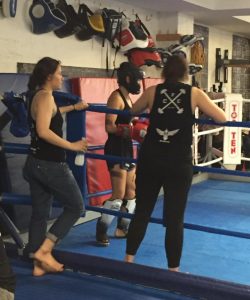
Training at Physical Culture Collective gave Cookson a new role in the sport of Muay Thai–that of a coach.
Owner Van Vlack says, “Naomi Cookson as an athlete is focused, driven, and wholeheartedly invested in her goals. As a coach, she is that at twice the volume. She is easily one of the most comprehensive and intuitive students of the combat sports coaching game I have had the pleasure of working with. She understands the fight game in a multidimensional sense and brings that to her athletes. If she chooses to work with you, she invests herself 100% in bringing out your best.”
With PCC being open for almost two years, Cookson and the other coaches are training more fighters. Despite the fact that coaching is mentally exhausting, they are well known for complete devotion to their students.
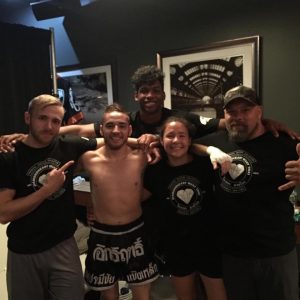
“I don’t think I know everything about Muay Thai at all, and I am very young in this sport compared to other coaches. However, one of my strengths is that I am a decent communicator and I work to really understand my fighters. How I coach them depends on the person. Some are natural athletes, very tough, and respond to anxiety in a powerful way. Others will react differently, and have a lot of trouble with various aspects of the sport. They get stressed out and are unable to relax in the ring. One of the mistakes I think a coach could do is just try to coach everyone the same way. There is a lot of diversity in people’s life experience and how they react to stress. Some people rise to the occasion and other people can just shut down when they are having a difficult time. I focus a lot on positive reinforcement and confidence building, but also purposefully putting them in stressful situations, whether it’s sparring or really intense conditioning, to allow them to experience breaking down, so they learn how to build themselves up again.”
True to her coaching style, Cookson has also been able to break herself down and rebuild who she is as a fighter.
“My last fight is where I found myself really coming into my own and finding myself as a real competitor. I was able to really feel powerful through the whole process and trust myself. When I finally got into the ring, I was really relaxed and felt so strong. I had a great coach and was able to leave behind this emotional baggage that I had been carrying around for years.”
She credits K-1 and MMA fighter Daria Albers for helping her through much of her struggle as well as helping her to learn more about the sport.
“I had one idea of what I thought Muay Thai was, especially NY Muay Thai–but there’s this whole other world out there: globally, nationally, regionally. She helped me to realize just how big the world of Muay Thai was and that it wasn’t just this bubble I thought it was. She’s had a great impact on my life as a mentor and a friend.
“Because of her, now I really believe that it doesn’t matter what your body looks like. It’s irrelevant. It’s all about your skill set. If you’re shorter and wider than your opponent, that just means you have to have different skills. If your opponent is taller, then you just have to be faster or stronger. That’s what it is in the sport anyhow, trading one advantage for another disadvantage. You’ll never have the “perfect” body for a sport, and that’s what I had been so wrapped up in for a very long time. It wasn’t so one-dimensional, but it was a huge source of stress. Instead of worrying about my height for the weight class and so on, Daria is very matter-of-fact and straightforward. She was clear that if I didn’t cut weight, I would get punched in the face a lot–so we would base our strategy on that. Instead of worrying about weight, I could focus on how I would move and what I would set up with. It was so freeing. I felt so much power than I ever had and was more relaxed than I’ve ever been in the ring. I fought someone 6 inches taller than me but it was one of my greatest fights.”
The way that Cookson was able to navigate through the distress and pain of an eating disorder was by deciding to be true to herself and her body.
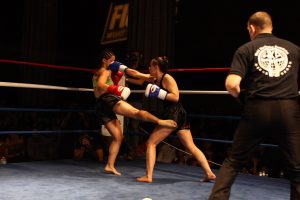
“I was always so focused on making other people happy, but once I stopped doing that–when I came into the fork in my path that says, “I’d rather not do Muay Thai than do Muay Thai this way”. When I realized I would give it up to make myself happy, I was totally free.”
She trains and fights in a way that is most comfortable for her, including wearing a shirt while she fights–foregoing the usual fight attire of a sports bra and Thai shorts.
“You have choices in all aspects of the sport and how to empower yourself, whether it is choosing not to cut weight, choosing to wear your shirt, choosing to not spar. Everyone is different. It’s not bad to be proud of your body: you look strong, powerful, and fit. It’s not bad to get in the ring and be proud of what you look like. But for me, it was a source of stress. I worried about how I looked so much, and I wanted to negate that. Just doing something simple like wearing a shirt helped me feel better about myself. Being lean and fit doesn’t translate into being a good fighter. Being comfortable with yourself emotionally and physically does. It took me a long time to learn that.”
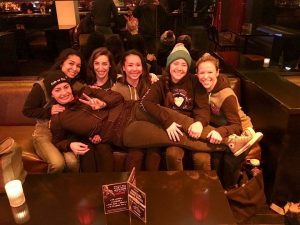
Coach Daria has witnessed much of Naomi’s growth and considers her to be a very dear, close friend.
She says, “If the universe would be reflected in one person, it would be in Naomi. She’s quiet and calm, but inside of her lies the inner strength of the whole cosmos, bringing together all elements, connecting the dots in a high-conscious awareness. With a very clear mind, the incredibly intelligent Naomi is an innovator. She’s always questioning and reinventing systems, while simply bringing the best out in people.”
The two of them have developed a very deep bond that is reflected in both their friendship and their coaching. Cookson sees Albers as her mentor and appreciates the feedback she is given as a coach and a fighter.
Naomi reflects that she and Daria, “talk a lot about the big picture. How do you teach someone to have fun when they’re sparring, instead of just teaching the techniques? I ask her for advice all the time. We watch fights and look out for what’s happening mentally with the fighters, emotionally how things are playing in the ring. She would ask me, ‘How would you coach this fighter?’ and puts it all in perspective for me. It’s important to keep an eye out for their emotions and fear. Sometimes emotion is more important than technique in the ring. If you’re an emotional disaster, you can have the best technique in the world but won’t be able to execute anything. How do you make sure when your fighter gets to the ring, how do you make sure they’re where they need to be, mentally, emotionally, and physically? That’s what we find to be most important than speed or strength.
“I learn something new every time I train with her. I do this because I love it and not because it’s work. Spending time with Daria helps me realize that. She’s just a really amazing coach.”
As the world of combat sports, particularly Muay Thai, continues to develop, Cookson is excited to see its growth.
“Women are coming into their own in the fight world. The competition pool is much deeper. Instead of making us work against each other, we are looking to empower each other. We want competition, we want this sport to be relevant. It’s been cool to see on the East Coast scene, women coming up as coaches, gym owners, and more fighters than before.”
When she’s not fighting or coaching, Naomi is working with Anne and friends Karen Miller and Margaux Genoff on self-defense seminars for women.
“We wanted to do something for other women, and empower people through confidence-building. It’s about learning to establish a boundary and fighting if the boundary is crossed. The seminar ended up being really awesome. We started with some BJJ standing, went to the ground, and learned how to get back to your feet. Seeing these women having a really good time was a great, and learning how to hit something just increases your confidence. Just the fact that you can do it–learn how to get hit and hit others without fear. There’s a lot of interest in us putting together another one, so we are working on it.”
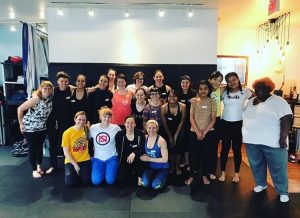
With 7 fights in the last 7 years, Cookson finds most of her energy going towards being more of a coach than a fighter.
“What the students can trust about me, is that I take them, their goals, and the sport very seriously. I help them really focus when they’re on the mats. I will be there for you 100% and help you get there. I’m very honest and will let them know the truth. Honesty is really important for your training–you need to know how you’re training accurately for your growth as an athlete and a person.
“The most meaningful for me is to give people access to the sport, however that is for them. If some of the people that I train now are still doing this in 15 years, that would make me incredibly happy. Helping others fall in love with this sport and go off and do their own things–their own coaching and fighting–is amazing.”
With her path behind her, it seems as though Cookson has made a road not just for herself, but for other women to follow in her footsteps.
“I think I’m very similar to a lot of women in this sport. Being hard on themselves, being perfectionists, thinking they’re worse than they are. I am constantly reminding them that they don’t need to be perfect. The goal is where you will be in 5 years, not where you will be in 5 minutes. I tell them to keep looking at the big picture. You don’t need to prove yourself to me–you just have to prove something to yourself, and from there, I’ll always believe in you.”
Writer: Pari Aryafar (@pariunderthesea)
Editor: Kyle Antonelli
Photos courtesy of Naomi Cookson
Tags: Amateur, daria albers, female fighter friday, gavin van vlack, Muay Thai, naomi cookson, New York Fighting, NYC, physical culture collective